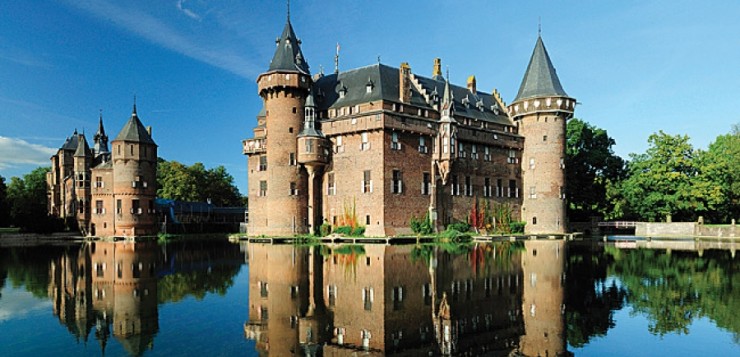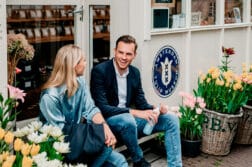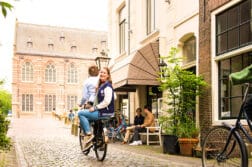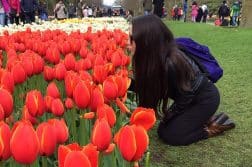Utrecht has a long, academic and cultural history. Already in the Early Middle Ages, noblemen and priests were educated in this city, located in the centre of the Netherlands. More recently, in 1955, my father, Rien Alfenaar, was the first of his family to go to university and experience student life. He still remembers this period as a very happy time. There are many differences, but also similarities with the experiences of today’s international students. In this article I would like you to meet my 70-year old father, a former chemistry student, and three international students at Hogeschool Utrecht University of Applied Sciences
In 1955, my father, Rien Alfenaar, was seventeen years old. He left home to study chemistry in Utrecht. The first room he rented was run by a couple with one grown-up daughter. The house had only one washbasin for the four occupants and no shower. During the winter Rien heated his room with a potbelly stove. “For each scuttle of coals, my landlords charged one Dutch guilder, a sum for which I could also buy a meal. I did not have a lot to spend, those days. So I tried not to use too many coals and you could often find me in the kitchen of the student club’s restaurant – washing dishes in exchange for free meals.”
Today, most students cook their own meals. Some foreign students are used to the dining halls at their home campuses and never touched a stove in their lives. So, in Utrecht they do not only acquire academic knowledge but also culinary skills. Some international students, like Stephanie Marita (21), a Civil Engineering student, enjoy the many exotic groceries in the city: “There are a lot of oriental supermarkets that sell the stuff I need to make Indonesian food. It makes me feel at home.”
During his first half year in Utrecht, Rien felt a bit lonely. “This explains why I spent so much time at my students’ club, Unitas. There were quite a few students’ clubs in Utrecht and many of them still exist. At the attic there was a lounge for female students, called Heaven. And in the basement you had Hell, for the men. I had dinner at Unitas every night. After dinner, we would play card games, sing students’ songs and entertain each other with ‘Lullepot’ – someone walking across the tables bragging nonsense. A few times a year we would rent a bus, and pay a surprise visit to a sister club in another city. We would have to ‘wrestle’ ourselves inside. After we managed to reach the bar, we drank a pint of beer together. On Fridays the club was always crowded. More than once I hadn’t slept when I took the train to see my parents on Saturday mornings, but it rarely happened that one of us was drunk.”
These days Utrecht still offers a vibrant student life. Outi Karvinen, a 24-year-old nursing student from Finland, is studying International Health Studies, a three-month programme at the Hogeschool Utrecht University of Applied Sciences: “Utrecht is a true student city. International students have parties all the time (much to the chagrin of their neighbours of course), and go clubbing every Tuesday night.” Outi found a better place to live than my father: “Student houses are full of life, and if you’re as lucky as I was, you get to know your housemates and they become your temporary family.”
The city of Utrecht is very old. It has many ancient buildings and terraced canals. Dallas Spieker, a 22-year old Canadian student in International Communication and Media, comments: “What I like about living in Utrecht is that I am surrounded by history. Another bonus is that completely different cultures encompass Holland. To the right is Germany, to the south, Belgium, and another skip, hop, and a jump and you could be in Switzerland. There is so much to see and do, but of course all ventures cost. And they cost in Euros.”
My father Rien didn’t have money or time to skip, hop, and jump to other countries. During the holidays he had to earn money to pay for his nights out and a small radio to keep him company in his room (until he met my mother). And, with the exception of a few South Africans, there were no students from abroad. Nowadays, Hogeschool Utrecht University of Applied Sciences, with its population of 34,000 students, receives about 900 foreign students per year. They come to Utrecht on exchange programmes, take non-degree programmes, minors, internships, enrol in our Summer School or on an English-taught bachelors or masters course. Most of the programmes take place at The Uithof, a modern campus. The Faculty of Communication and Journalism is a nice example of an ultramodern building. Dallas Spieker: “It reflects what each student aspires to, once their studies are complete: creativity and modernity.” She gives an example: “Upon entering the building, there is an electronic news feed which extends over the doorway, showing current news, weather and faculty information.”
In the fifties, university buildings were more traditional. There were lecture rooms and laboratories, no cafeterias. Also, the relations between people were different than today. “As a student you had no contacts with your neighbours, only with other students. And there was more distance between teachers and students. For example, you did not dare to speak to a professor. But, once a year we socialised – that was during a soccer match between the Analytical Lab and the Organic Lab. The match was refereed by the milkman who delivered milk to both labs, every day during lunch time. By the way, we drank our milk and ate our sandwiches between the test tubes and chemicals in the labs. No one was aware of any health risks.”
What do international students think of the Dutch? Dallas from Canada: “The Dutch are a very metropolitan and international people. Well, at least this generation is. I was taken by surprise when I found out my elderly landlord didn’t speak English. I had never met anyone in Holland who didn’t speak English. However, we’ve come to a unique understanding. I practice my beginner, pre-school Dutch and he his mediocre English.” Outi Karvinen: “People are more open and straightforward in Holland. People in Finland tend to be a bit more reserved and take their time getting to know people and new things. I like the people! When you get used to the Dutch way of always speaking your mind, it’s actually refreshing.”
Does my dear dad have some (grand)fatherly advice for students coming to Utrecht?
“Join a students’ club – it will help you to get to know people – and become a member of a sports club, this will force you to live a regular life, which will benefit your studies.”
Contributed by:
Karin Alfenaar, Senior Policy Advisor for Internationalisation at Hogeschool Utrecht University of Applied Sciences. She studied international law in Utrecht.
www.international.hu.nl/
karin.alfenaar@hu.nl







